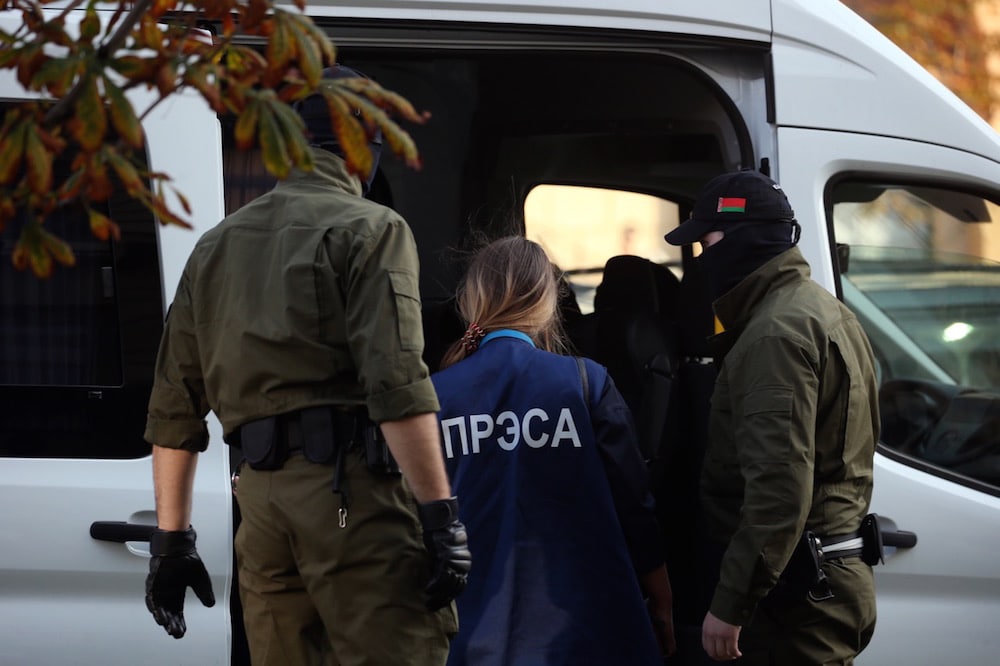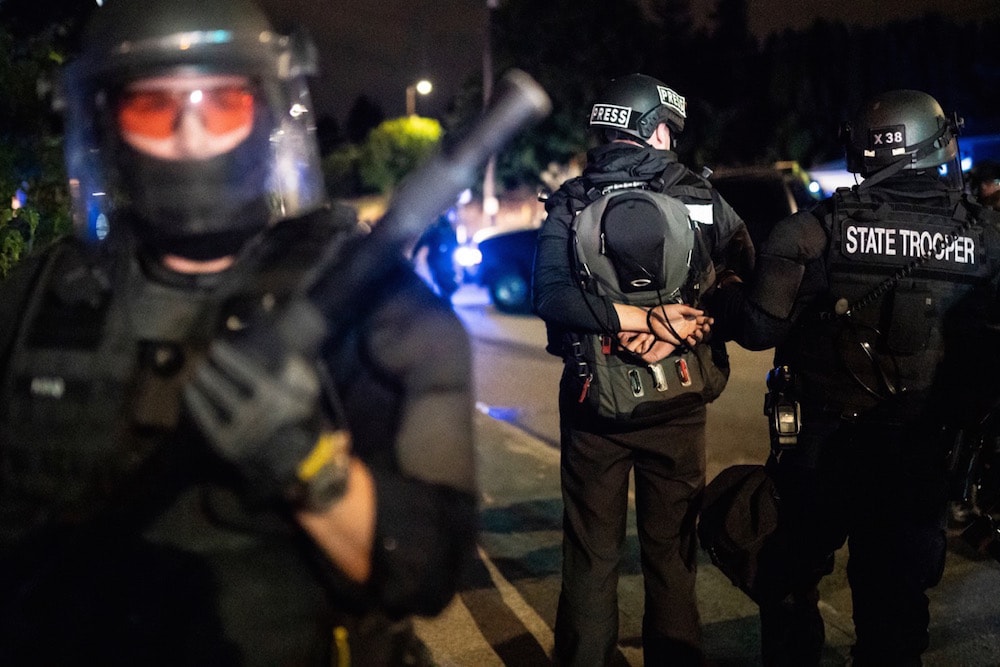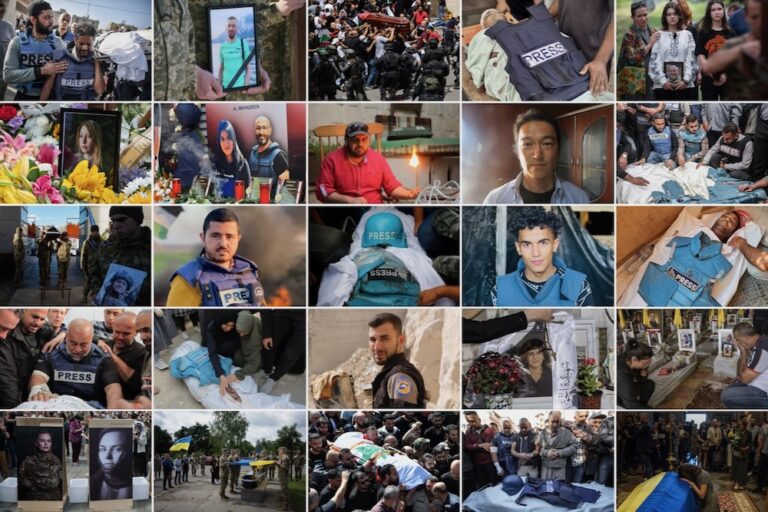At least 274 journalists were in jail in relation to their work on 1 December 2020. China was the world’s worst jailer for the second year in a row. It was followed by Turkey, Egypt and Saudi Arabia.
This statement was originally published on cpj.org on 15 December 2020.
The number of journalists jailed globally because of their work hit a new high in 2020 as governments cracked down on coverage of COVID-19 or tried to suppress reporting on political unrest. Authoritarians again took cover in anti-press rhetoric from the United States. A CPJ special report by Elana Beiser
A record number of journalists were imprisoned globally for their work in 2020 as authoritarian nations arrested many covering COVID-19 or political instability. Amid the pandemic, governments delayed trials, restricted visitors, and disregarded the increased health risk in prison; at least two journalists died after contracting the disease in custody.
In its annual global survey, the Committee to Protect Journalists found at least 274 journalists in jail in relation to their work on December 1, 2020, exceeding the high of 272 in 2016. China, which arrested several journalists for their coverage of the pandemic, was the world’s worst jailer for the second year in a row. It was followed by Turkey, which continues to try journalists free on parole and arrest new ones; Egypt, which went to great lengths to keep custody of journalists not convicted of any crime; and Saudi Arabia. Countries where the number of jailed journalists rose significantly include Belarus, where mass protests have ensued over the disputed re-election of the long-time president, and Ethiopia, where political unrest has degenerated into armed conflict.
This marks the fifth consecutive year that repressive governments have imprisoned at least 250 journalists. Lack of global leadership on democratic values – particularly from the United States, where President Donald Trump has inexhaustibly denigrated the press and cozied up to dictators such as Egyptian President Abdelfattah el-Sisi – has perpetuated the crisis. As authoritarians leveraged Trump’s “fake news” rhetoric to justify their actions – particularly in Egypt – the number of journalists jailed on “false news” charges steadily increased. This year, 34 journalists were jailed for “false news,” compared with 31 last year.
Within the United States, no journalists were jailed at the time of CPJ’s prison census, but an unprecedented 110 journalists were arrested or criminally charged in 2020 and around 300 were assaulted, the majority by law enforcement, according to the U.S. Press Freedom Tracker. At least 12 still face criminal charges, some of which carry jail terms. Observers told CPJ that the polarized political climate, militarized law enforcement, and vitriol toward the media combined during a wave of protests to eradicate norms that once afforded journalists police protection.
CPJ has published recommendations to the incoming administration of President-elect Joe Biden for restoring U.S. press freedom leadership globally, which include ensuring accountability for the domestic attacks on journalists as well as instructing diplomats abroad to attend trials of journalists and speak out in support of independent media. CPJ found the lack of trust in media in the U.S. to be particularly dangerous during the global pandemic.
In China, many of the 47 prisoners are serving long sentences, or are jailed in Xinjiang province without any charge disclosed. But as the coronavirus ravaged the city of Wuhan in Hubei province early this year, authorities arrested several journalists for coverage that threatened the official narrative of Beijing’s response. The three still jailed on December 1 include independent video journalist Zhang Zhan, who began posting reports from Wuhan on Twitter and YouTube in early February and was arrested on May 14. Her videos include interviews with local business owners and workers on the impact of COVID-19 and the government’s response to it.
Zhang Zhan was one of dozens in CPJ’s global census who relied heavily on social media – platforms to which journalists especially turn when all other outlets are heavily censored or controlled by the state. Her videos are likely still available to a global audience because they are hosted by companies outside China. But CPJ found that similar content produced by others who were later jailed had been taken down for reasons that were not clear, hindering research and underscoring longstanding concerns about transparency by global tech giants like Google, Twitter, and Facebook.
Also in China, diplomatic spats appeared to put foreign media in increased peril, in a year where more than a dozen journalists working for U.S. publications on the mainland were expelled. Australian citizen Cheng Lei, a business news anchor for state-run broadcaster China Global Television Network, was arrested in August for allegedly endangering national security amid tension between China and Australia, making her the second Australian journalist in custody after blogger Yang Hengjun, who has been held on espionage charges since January 2019.
Egyptian authorities, meanwhile, intensified their spree of arrests, charges, and indefinite renewals of pretrial detention, bringing the number of journalists in jail to 27, matching a record set in 2016. In November alone, prosecutors slapped new terrorism charges on photographer Sayed Abd Ellah and blogger Mohamed “Oxygen” Ibrahim to get around a court order that they be released. Since April 2019, Egyptian authorities have used similar tactics to extend the detentions of at least eight other journalists, CPJ has documented.
This year, the crackdown in Egypt appeared to proceed sometimes because of, and sometimes in spite of, the pandemic; and in one case authorities’ actions were fatal. At least three journalists were arrested for their work on COVID-19, such as criticizing a lack of state media coverage of doctors and nurses who contracted the illness. The Ministry of Interior banned visitors, including family members and lawyers, from visiting prisons from early March to mid-August, citing the virus.
Yet Egyptian state security officers arrested Sayed Shehta on August 30 at his home in Giza, where he was self-quarantining after being diagnosed with COVID-19; he passed out at the police station, and then was taken to a hospital, where he was handcuffed to his bed in the intensive care unit. But Mohamed Monir suffered a worse fate. The veteran journalist was arrested on June 15 on charges of joining a terrorist group, spreading false news, and misusing social media, after criticizing the government’s handling of the COVID-19 pandemic, including in a May 26 interview and June 14 column on Al-Jazeera. Monir fell ill while in Cairo’s Tora Prison, was released on July 2, and died on July 13 at a Giza hospital of complications from COVID-19.

Masked law enforcement officers detain a journalist during a protest by opposition supporters, in Minsk, Belarus, 26 September 2020, Natalia Fedosenko TASS via Getty Images
Worldwide, at least one other journalist died after contracting the virus in custody. Honduran journalist David Romero – director of Radio Globo and Globo TV, who was serving a 10-year sentence for defaming a former prosecutor – died on July 18 after contracting COVID-19 while imprisoned at a facility in Támara, near the capital, Tegucigalpa. The risk of exposure to the virus in prison prompted CPJ to join with 190 other groups to urge world leaders to release all journalists jailed for their work in the #FreeThePress campaign.
International Press Freedom Awardee Azimjon Askarov also died in prison in 2020, following years of campaigning for Kyrgyz authorities to release him by the U.N. Human Rights Committee, CPJ, and other advocacy groups. Askarov was sentenced to life on fabricated charges, in retaliation for his exposure of police abuses. The journalist’s wife, Khadicha Askarova, told CPJ that Askarov had been unable to walk and had a fever for weeks prior to his death, and she suspected he had contracted COVID-19 but the prison administration did not test him.
Elsewhere in Europe and Central Asia, journalists were caught up in Belarus unrest; President Aleksandr Lukashenko claimed victory for a sixth term in an election widely seen as fraudulent, sparking mass protests. Authorities arrested dozens of journalists, sentencing many to fines or administrative detention and prison stays of one to two weeks, but some face more serious charges. As of December 1, at least 10 journalists were jailed in Belarus; they were the first listed on CPJ’s census in that country since 2014.
Read the full report on CPJ’s site.



